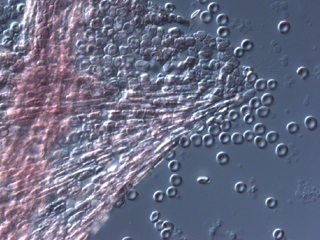Blood:
The body's vital defense force
The body's vital defense force
When the immune system goes awry
For most of us, and for most of our lives, the immune system does its job to perfection. Occasionally, however, an overzealous immune system is the cause of a condition or disease. Allergies, for example, are actually the out-of-control responses of our own T cells. An allergy is caused when your body perceives some chemical- from a bee, a poison oak leaf, or some type of food-as a foreign substance. The T cells responsible for going after the substance mount a prolific response. But the allergy sufferer either has too few regulator T cells to control the response, or the response is so strong that it overrides regulation. In either case, the result can be a rash, stuffy head, or inflammation.
Overactive macrophages can also cause debilitating inflammation. Arthritis is painful swelling in the joints that happens when the body has triggered an inappropriate immune response. Macrophages move into the scene, and their presence encourages blood flow. The excess white cells and whole blood cause tissues to swell. Because the system started acting up without a real cause, the swelling cycle may also stop as randomly as it started. There is also evidence that macrophages play a role in other conditions, such as psoriasis and atherosclerosis .
Telling good cells from bad
Most of the time, your white blood cells recognize the other types of cells that make up your body and don’t attack them. But there are times when you want your WBCs to attack your own cells. T cells have a way of recognizing cells from your body that are misbehaving—in other words, cells that are threatening to divide uncontrollably and cause cancerous tumors. T cells often turn their attacks on precancerous cells. In fact, some researchers believe this is actually one of their primary functions.
When a person receives an organ transplant, of course, they’re getting someone else’s cells. The natural response of the recipient’s T cells would be to attack those foreign cells, even though they were transplanted to save the person’s life. That’s why doctors have to try to prevent the recipient’s immune system from seeing the new organ as an invader to be destroyed. Drugs like cyclosporine are used to hinder the body’s immune response to transplanted tissues—but they’re used with caution, because they may also affect immune responses to other invaders. A similar situation arises with blood transfusions, which is why doctors have to make sure that blood donors and recipients have compatible blood types.
The symbolic power of blood in many cultures is not surprising, especially when you consider the emotional impact of seeing it flow from an injury. It’s one of the few internal tissues that we occasionally get a glimpse of—and when we do, it usually means something bad has happened. But even when it’s out of sight, blood is working behind the scenes, ferrying oxygen and nutrients and providing a vital defense force for your body.
For most of us, and for most of our lives, the immune system does its job to perfection. Occasionally, however, an overzealous immune system is the cause of a condition or disease. Allergies, for example, are actually the out-of-control responses of our own T cells. An allergy is caused when your body perceives some chemical- from a bee, a poison oak leaf, or some type of food-as a foreign substance. The T cells responsible for going after the substance mount a prolific response. But the allergy sufferer either has too few regulator T cells to control the response, or the response is so strong that it overrides regulation. In either case, the result can be a rash, stuffy head, or inflammation.
Overactive macrophages can also cause debilitating inflammation. Arthritis is painful swelling in the joints that happens when the body has triggered an inappropriate immune response. Macrophages move into the scene, and their presence encourages blood flow. The excess white cells and whole blood cause tissues to swell. Because the system started acting up without a real cause, the swelling cycle may also stop as randomly as it started. There is also evidence that macrophages play a role in other conditions, such as psoriasis and atherosclerosis .
Telling good cells from bad
Most of the time, your white blood cells recognize the other types of cells that make up your body and don’t attack them. But there are times when you want your WBCs to attack your own cells. T cells have a way of recognizing cells from your body that are misbehaving—in other words, cells that are threatening to divide uncontrollably and cause cancerous tumors. T cells often turn their attacks on precancerous cells. In fact, some researchers believe this is actually one of their primary functions.
When a person receives an organ transplant, of course, they’re getting someone else’s cells. The natural response of the recipient’s T cells would be to attack those foreign cells, even though they were transplanted to save the person’s life. That’s why doctors have to try to prevent the recipient’s immune system from seeing the new organ as an invader to be destroyed. Drugs like cyclosporine are used to hinder the body’s immune response to transplanted tissues—but they’re used with caution, because they may also affect immune responses to other invaders. A similar situation arises with blood transfusions, which is why doctors have to make sure that blood donors and recipients have compatible blood types.
The symbolic power of blood in many cultures is not surprising, especially when you consider the emotional impact of seeing it flow from an injury. It’s one of the few internal tissues that we occasionally get a glimpse of—and when we do, it usually means something bad has happened. But even when it’s out of sight, blood is working behind the scenes, ferrying oxygen and nutrients and providing a vital defense force for your body.







